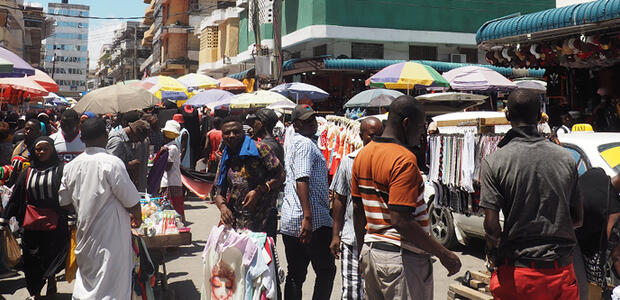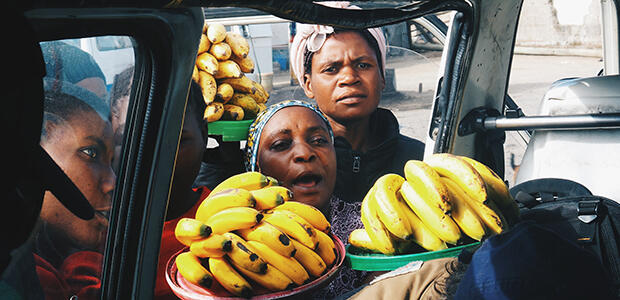Working Paper
Household bargaining and spending on children
This paper studies whether increasing the wife’s bargaining power results in couples allocating more resources to their child, and, if so, what the underlying mechanisms for this are. We conduct a novel between-subject lab experiment in Tanzania, in...
Working Paper
The effects of land titling in Tanzania
We use household survey data to investigate the effects of formal, private property rights to agricultural land on agricultural investment, land valuation and access to credit in Tanzania. Results show that while there are no detectable effects of...
Working Paper
Entrepreneurship and human capital development in children
This paper explores the link between entrepreneurship and child human capital development. We specifically examine how operating a non-farm enterprise (NFE) as opposed to working in agriculture relates to child labour and schooling outcomes...
Working Paper
Tanzania—from mining to oil and gas
This paper extends UNU-WIDER Working Paper 2016/79, which examined the economic situation in Tanzania during the resurgence of gold and diamond production after 1999, with the situation that emerged as the country began to exploit its very large...
Working Paper
The counting approach to multidimensional poverty
This paper investigates the levels and evolution of poverty in Malawi, Mozambique, Tanzania, and Zimbabwe using the decomposability properties of poverty measures based on a counting approach. We compare poverty measures such as the Alkire and Foster...
Working Paper
Formal education, malaria preventive behaviour, and children’s malarial status in Tanzania
In this study, we assess formal education as a causal determinant of women’s malaria preventive behaviour, as well as children’s risk of malaria infection. For identification, we rely on exogenous variation in educational attainment generated by...
Journal Article
The impact of intergovernmental transfers on local revenue generation in Sub-Saharan Africa
Do intergovernmental transfers reduce revenues collected by local government authorities (LGAs)? There is already a well-established body of literature in public finance, which argues that intergovernmental grants “crowd out” local revenues. Most...
Working Paper
Implementation of local content regulation
Based on a case study of an anonymous mining company in Tanzania, this study assesses the implementation of the local content (LC) regulations and guidelines in the country. The analysis focused on the key LC aspects of the direct workforce...
Working Paper
The link between public debt and public investment in Tanzania
In a bid to realize its development aspirations, Tanzania has made concerted efforts to increase public investment, particularly in the last decade. A significant proportion of these investments are financed by contracting debt, manifested by the...
Working Paper
Social protection for working-age women in Tanzania
Tanzania has expanded its social protection framework significantly over the past decade, but the country continues to grapple with important gender inequalities. This paper examines, first, the evolution and effects of Tanzania’s social protection...
Working Paper
Incorporating informal workers into social insurance in Tanzania
Expansion of social protection reach among workers in the large informal economy represents a persisting and thorny challenge in the development context. In Mainland Tanzania, several domestically led policy reforms have been introduced to...
Working Paper
Determinants of domestic savings in Tanzania
This paper examines trends and determinants of gross domestic savings in Tanzania using data for the period 1990–2020. The autoregressive distributed lag approach is employed to empirically analyse the short-run and long-run relationships. There has...
Working Paper
Employment policy in Mainland Tanzania: what’s in it for women?
Tanzania has experienced relatively strong and stable economic growth accompanied by social stability over the past two decades. The country is also pursuing an ambitious development plan with significant employment objectives. For development to be...
Working Paper
The Tanzanian state response to COVID-19
Tanzania received significant global attention for its COVID-19 response during the first year of the pandemic. It did not share pandemic statistics, require masks, implement lockdowns, or close borders; it questioned testing and vaccine efficacy...
Working Paper
Weather shocks and child nutrition
In this paper, we examine the relationship between childhood exposure to adverse weather shocks and nutritional and health outcomes of children in Tanzania. Using household panel data matched with spatially disaggregated data on weather shocks, we...
Working Paper
A comparative study of export processing zones in the wake of the Sustainable Development Goals
The objective of this research is to assess the extent to which export processing zones in Botswana, Kenya, Tanzania, and Zimbabwe integrate the Sustainable Development Goals in their implementation and operations. We focused on four Sustainable...
Working Paper
Trade effects of the East Africa Customs Union in Tanzania
By measuring the effects of forming and joining a regional integration bloc using an augmented structural gravity model, this paper finds that the East African Community (EAC) and EAC Customs Union have significantly enhanced Tanzanian trade into EAC...
Working Paper
Towards sustainable livelihood in the Tanzanian informal economy
In spite of having some intensive national strategies to address poverty, Tanzania lacks a coherent national strategy to ensure sustainable livelihoods for those working in its informal economy, of which street vending is an important sector. Based...
Working Paper
Gender disparities in financial inclusion in Tanzania
Although Tanzania has made notable progress in enhancing access to financial services, the gender gap in financial inclusion persists. This paper examines gender disparities in financial inclusion in Tanzania using descriptive and regression analyses...
Working Paper
Gender differences in formal wage employment in urban Tanzania
This paper uses the latest Tanzania labour force survey—the Integrated Labour Force Survey—and a censored bivariate probit model to analyse gender differences in labour force participation and gender bias in formal wage employment in urban Tanzania...
Working Paper
Effectiveness of strategic environmental assessment in promoting sustainable development in Tanzania
This paper examines the extent to which strategic environmental assessment (SEA) is implemented in Tanzania and whether its implementation is in line with generally practised procedures/criteria. Out of 17 completed SEA, eight cases were purposively...
Working Paper
Promoting environmental sustainability in the artisanal and small-scale mining sector in Tanzania
This study examines the interaction between formalization of the artisanal and small-scale mining subsector and the regulation of negative environmental impacts in Tanzania. Formalization generally seeks to move the artisanal and small-scale mining...
Blog
Ending aid dependency: Taxation in developing countries can be improved through collaboration
Finland aims to raise the amount of its development assistance to 0.7% of GDP, and this goal has good grounds. But how can we make sure that the...
Working Paper
Two decades of Tanzanian health policy
Tanzania has undertaken important health sector reforms in the new millennium, and the most recent Health Sector Strategic Plan (2021–26) lays out ambitious targets to achieve universal health coverage. Yet, women in Tanzania continue to face...
Working Paper
Exploring social policy trajectories in Mainland Tanzania
In July 2020, the United Republic of Tanzania gained the status of a lower-middle-income country. This came after two decades of significant social policy reforms and transformations in the country’s economic structures. This paper explores social...
Working Paper
The informal sector and the safety of female traders in Tanzania
This paper assesses the participation of female traders, safety factors, and existing policies and legislation in the informal sector in Tanzania. Primary data were obtained from 11 in-depth interviews, 10 focused group discussions, and 236...

 Join the network
Join the network









